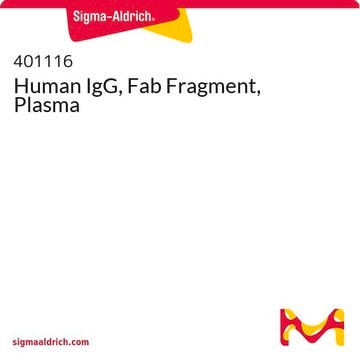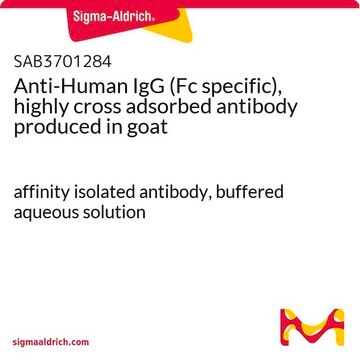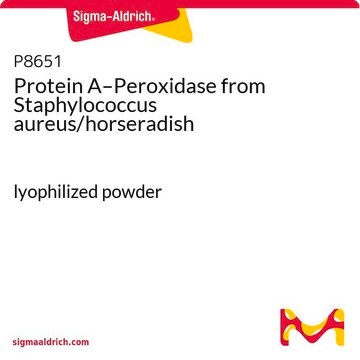I3391
Anti-Human IgG (Fc specific), F(ab′)2 fragment antibody produced in goat
affinity isolated antibody, buffered aqueous solution
Synonym(s):
Goat anti-human IgG
Sign Into View Organizational & Contract Pricing
All Photos(1)
About This Item
Recommended Products
biological source
goat
Quality Level
conjugate
unconjugated
antibody form
affinity isolated antibody
antibody product type
secondary antibodies
clone
polyclonal
form
buffered aqueous solution
concentration
2.0 mg/mL protein
shipped in
dry ice
storage temp.
−20°C
target post-translational modification
unmodified
General description
IgG antibody plays a crucial role in humoral immune responses such as phagocytosis, complement activation, placental transport and cell surface-receptor binding. Anti-human IgG (Fc specific), F(ab′)2 fragment antibody can be used as a capture antibody in antibody-binding assay for soluble ICAM-1-Fc. Goat anti-human-IgG (Fc specific) F(ab′)2 antibody reacts specifically with human IgG but does not react with other immunoglobulins.
IgG is the main type of antibody in human serum, secreted by the B cells. It consists of four polypeptide chains, made of two identical 50 kDa γ heavy (H) chains and two identical 25 kDa κ or λ light (L) chains, which are linked by inter-chain disulfide bonds. IgG contains four isotypes IgG1, IgG2, IgG3 and IgG4.
Immunogen
Purified human IgG
Application
Anti-Human IgG (Fc specific), F(ab′)2 fragment antibody produced in goat has been used in studying the antibody binding assay of soluble intercellular adhesion molecule-1 (ICAM-1)-Fc.
Anti-human IgG (Fc specific), F(ab′)2 fragment antibody can be used in ELISA to determine human IgG1-Fc protein.
Biochem/physiol Actions
IgG stimulates the classical pathway of the complement system. It neutralizes virus particles and toxins. IgG plays a crucial role in antibody-dependent cell-mediated cytotoxicity (ADCC). IgG might be associated with allergy. It has the longest serum half life.
Other Notes
Antibody adsorbed with mouse and rat IgG
Physical form
Solution in 0.01 M phosphate buffered saline, pH 7.4, containing 0.05% sodium azide
Preparation Note
Adsorbed to reduce background with mouse or rat samples.
Useful when trying to avoid background staining due to the presence of Fc receptors.
Useful when trying to avoid background staining due to the presence of Fc receptors.
Disclaimer
Unless otherwise stated in our catalog or other company documentation accompanying the product(s), our products are intended for research use only and are not to be used for any other purpose, which includes but is not limited to, unauthorized commercial uses, in vitro diagnostic uses, ex vivo or in vivo therapeutic uses or any type of consumption or application to humans or animals.
Not finding the right product?
Try our Product Selector Tool.
Storage Class Code
12 - Non Combustible Liquids
WGK
nwg
Flash Point(F)
Not applicable
Flash Point(C)
Not applicable
Certificates of Analysis (COA)
Search for Certificates of Analysis (COA) by entering the products Lot/Batch Number. Lot and Batch Numbers can be found on a product’s label following the words ‘Lot’ or ‘Batch’.
Already Own This Product?
Find documentation for the products that you have recently purchased in the Document Library.
Customers Also Viewed
Gang Song et al.
The Journal of biological chemistry, 281(8), 5042-5049 (2005-12-16)
The interaction between integrin lymphocyte function-associated antigen-1 (LFA-1) and its ligand intercellular adhesion molecule-1 (ICAM-1) is critical in immunological and inflammatory reactions but, like other adhesive interactions, is of low affinity. Here, multiple rational design methods were used to engineer
Yusuke Higuchi et al.
Nature communications, 12(1), 3802-3802 (2021-06-23)
SARS-CoV-2 has mutated during the global pandemic leading to viral adaptation to medications and vaccinations. Here we describe an engineered human virus receptor, ACE2, by mutagenesis and screening for binding to the receptor binding domain (RBD). Three cycles of random
Rational design of intercellular adhesion molecule-1 (ICAM-1) variants for antagonizing integrin lymphocyte function-associated antigen-1-dependent adhesion
Song G, et al.
The Journal of Biological Chemistry, 281(8), 5042-5049 (2006)
Leander Blaas et al.
BMC biotechnology, 9, 3-3 (2009-01-16)
The development of appropriate expression vectors for large scale protein production constitutes a critical step in recombinant protein production. The use of conventional expression vectors to obtain cell lines is a cumbersome procedure. Often, stable cell lines produce low protein
Camila A Wilkens et al.
PloS one, 10(3), e0119053-e0119053 (2015-03-15)
Cell engineering has been used to improve animal cells' central carbon metabolism. Due to the central carbon metabolism's inefficiency and limiting input of carbons into the TCA cycle, key reactions belonging to these pathways have been targeted to improve cultures'
Our team of scientists has experience in all areas of research including Life Science, Material Science, Chemical Synthesis, Chromatography, Analytical and many others.
Contact Technical Service















